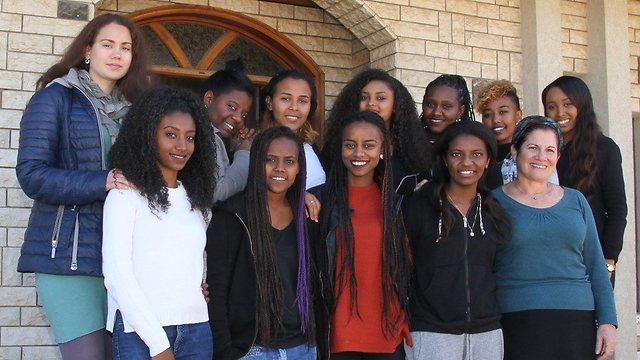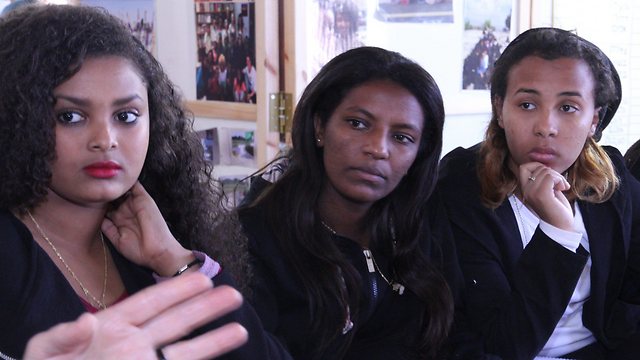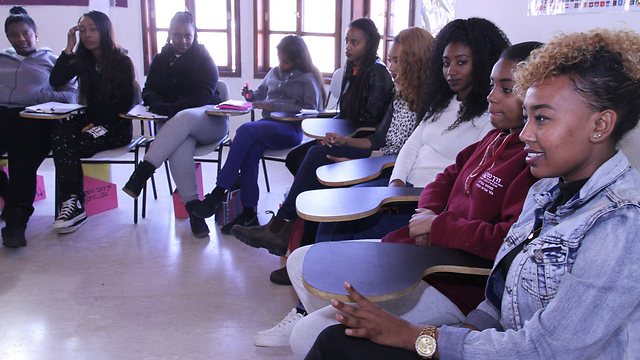Beating the odds: Ethiopian-Israeli women work for IDF roles
Preperatory program helps military-bound Ethiopian-Israelis overcome typical hurdles such as cultural bias to obtain the coveted roles they really want; these ambitious young women spend a year preparing for their service.
A group of girls aged 18-19, who recently graduated from high school, sits in a circle in the living room of a house, looking at a graph projecting on the wall, showing data on the number of working women in Israel.
They're talking about the numbers and slowly realize the meaning behind them: "It's best to start academic studies as soon as possible, immediately after the army," says one of them. "In order to get a high-paying job, it's best to pursue higher education, and that is hard to do when you have children."
Dr. Merav Maidan, the group's facilitator, presents them with more data, which draws them into quite the practical debate.
"A husband must be considerate and help his wife, he is not the only one who should get ahead in life," says one of the girls. "When I become a manager, I will promote as many women as possible - it's hard enough as it is for them."
When they take a break, Maidan explains that this class is part of the curriculum here in the pre-military academy.
Are these revised lessons to what they learned in high school civics class? "We teach them to come and ask the questions not from the point of view of the rulers, the government and the state, but from their own point of view, their difficulties and preferences," says Dr. Maidan. "We teach them critical thinking, we tell them, 'don't accept everything you're being told, try to figure out where your place is in relation to that, be prepared to encounter the glass ceiling that awaits you, and know that the chance to change your future or your own destiny is in your hands.'"
Last in line
The 25 young women standing outside the house, which is perched on a green hillside east of Migdal HaEmek, know their place in the Israeli equation, which takes into consideration ethnicity, place of residence and parents' education, in making the decision of where to place them in their military service. If you are the daughter of Ethiopian migrants, you can forget about the IDF taking your dreams, or your potential - unfulfilled during high school - into consideration.
Each of these young women, who are enjoying their break in the winter sun of the Jezreel Valley, has learned the hard way that the military's radar missed her not just because she did not have anything to offer the military occupational specialty qualification system, or because of the lack of adequate preparation for military tryouts, but also because her parents have never been part of the IDF system and because this is the first time anyone in the family is enlisting.
This is a natural route for native-born Israelis, but it is an unknown path for those who go there for the first time. The vast majority are daughters of Ethiopian immigrants, and a few from the former Soviet Union, but they all came here to divert from the path they are on ahead of the military. This means in practice that the girls in the program had grades on the qualifying tests of 10 to 30, with the maximum rating being 90. Their qualification rating never exceeds 45, which is below the 46-50 average required for admission.
"Anyone that has fire in their belly and a strong desire to work and succeed in finding good positions in the military" can get in, says the head of the preparatory program, Anat Steiner. "Anyone who believes that she can do more than what the military said she could. Last year, we had three girls whom the military had already informed that they would not be enlisted because of low scores. All three joined. Eventually one graduated with honors in basic training. Everyone who comes here learns to believe in herself and to challenge the system until she finds her proper role. "
Steiner, a veteran educator who ran a school in Jerusalem for many years, finds the girls through footwork that she carries out across the country during her visits to many boarding schools, high schools and youth villages.
This is the third year of operations for the successful Derech Kfar (The Village Way) Educational Institute, which outlines a practical path and vision to 30 high schools, youth villages and boarding schools across the country that involve at-risk youth. The Institute also operates two military preparatory programs – the program at Migdal HaEmek and one for males at Hatzor Haglilit.
"The idea for the establishment of the preparatory programs belonged to CEO of Derech Kfar, Haim Rubovitch, and Susan Weil, director of external relations of the organization," says Steiner.
Thirty years after the large influx from Ethiopia, most Ethiopian-Israeli soldiers were born in Israel, and the demographic has high recruitment rates of between 85 and 87 to percent. That rate is similar to that in kibbutzes and religious communities, but that is where the similarity ends, and the tragedy begins.
Among Ethiopian-Israelis in the military, there is a high proportion of desertion, absence without leave, arrests, detention, and suicide. Between 2007 and 2012, ten Ethiopian soldiers committed suicide, five or six more than would be expected based on population size.
This only deepens the insecuries of those community members being recruited. Because of this problem, the military has created a special department for the treatment of young Ethiopian recruits, but it seems that the recruitment process is only a reflection of the real problem, which begins during the parents' absorption in Israel.
Hadas Tafta of Rehevot wants to be a social services NCO, but was stunned to discover that the highest job she can have in the IDF is a driver. "With a qualifying score of 49 and a test score of 30, I have no chance to be summoned to try out for the role I wanted," she says. "When I first went into the processing station, I could sense that I was not responding correctly in the test, I found it hard but I was not surprised. I knew in advance what the measures are that calculate the components making up my scores, and it is well-known that Ethiopians cannot get a high ranking because most have uneducated parents who earn low wages."
She is the first daughter to enlist in her family. (Her older sister completed National Service.) "It is important for me to do it properly, to contribute in a role that will manifest my abilities and my strengths," says Tafta. "As a social services NCO, I could help many more Ethiopian soldiers in distress. I was in their position."
Tigist Agidao of Kiryat Bialik also realizedshe had to adjust her expectations for the IDF after her desire to be an assessor in the military corrections system encountered the military’s initial assessment referring her to the role of a cook or a secretary.
"It all started out wrong," she says. "I did not even get a summons to go to the processing station. Where I volunteered in high school, there was a soldier who inquired for me why I did not get the summons like everyone else. It turned out they sent it three times incorrectly, and if I had not insisted on pursuing them, I would have been arrested because I did not report to the processing center. "
Tigist and Hadas are proud of the full matriculation certificates that they achieved in high school, but find it difficult to accept the fact that it's not their achievements that are measured by IDF’s classification system, but rather the socio-economic status of their home environment.
“I was very nervous about the process before I even started, says Agidao. "I have no one to consult, my parents did not know this experience at all, and they do not understand the implications of these tests. I was worried I would not get what I wanted, and it angered me that no matter how much I achieved, my numbers would still be low. "
She took sample tests from the internet and practiced them dozens of times before first being summoned to the processing station. "I felt like there was no way I was getting low scores, and believing I would receive a score over 50. I received a 48."
Here, at the preparatory program that includes two rented houses on the same street that overlook a quiet town, the military is a parable for life: the faster you correct course, the sooner you reach your goal.
Steiner says the first barrier for the girls is actually in their homes. "Parents do not like the idea of wasting a year," she says. "They would prefer that the girls serve a year in the National Service and finish their commitment as soon as possible. Military service is still not greeted with joy, and certainly not another year of preparatory courses."
To Steiner, the girls are pioneers not only in their intense motivation to serve in order to feel part of Israeli society, but also in that they are willing to spend an extra year for the chance to improve their placement.
The results show that the formula works: two previous cycles showed 100 percent recruitment and assignment to a variety of functions that require screening and training, such as medics, social services NCOs, drill instructors, intelligence NCOs, combat roles, and more.
Out of 14 graduates of the first class, six received certificates of merit, and three have been designated to become commissioned officers. Among the 18 graduates of the second class, who joined recently, four have already received certificates of merit during training, and another received one at the end of a course she passed successfully.
'The assessments are fossils'
The morning began with a half-hour in which girls take turns choosing a topic that interests her and practices their instructional skills before an audience. "They are beginning to realize that it is possible to change reality," says Steiner. "They know they are at the bottom by the rating they received. To me, it is clear that there is no correlation between the girls' abilities and the roles they received. The military's screening tests are totally dependent on culture, but I tell them: 'It is true that these are your scores, but come be with us for a year and discover your capabilities.' During the year, they go to tryouts that were not in their portfolio, and prove to everyone that they can be placed as high as possible. "
Summons for tryouts are obtained by Steiner via her contacts in the military. “The Ethiopian aid department helps us, and I myself obtain the personal phone numbers of those responsible for the qualifying tests and request that they invite the girls," she says. "I call, nag and push. The girls have no social network of contacts, there is no one to open doors for them, and that's another thing we can give them. "
Steiner teaches the girls that reality is no excuse. "The military’s tests are fossils," she says. "They are not suited to the girls’ capacities, but they can still beat them."
This pragmatic educational approach does not see the cultural diversity as an obstacle,which is reflected in the girlss attitudes.
"From an early age, I've been used to translating to my parents what the teacher told them during parent-teacher conferences," says Tigist "My place as their child was always I needed to guide and lead and fend for myself. I was never angry with them for not understanding the language or not coming to pick me up in the car after an annual three-day trip. All I want is to have pride and to show them that I am like everyone here in Israel, that I am able to serve in a meaningful role in the military and contribute in the best way I can."













